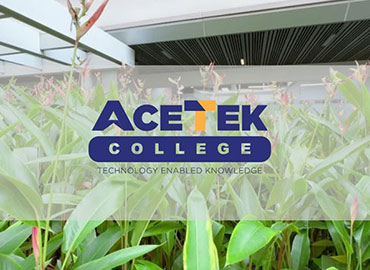
Diploma in Hospitality Management
Course Synopsis:
The Diploma in Hospitality Management seamlessly blends theoretical knowledge with practical, hands-on experience, empowering learners with the essential skills and tools to excel in the dynamic and tech-driven hospitality industry. Through a technology-integrated curriculum, students explore innovative solutions across key areas such as communication, marketing, operations, finance, food and beverage, and organizational behavior. The program cultivates digital fluency, tech-enhanced problem-solving, and a deep understanding of the role of technology in shaping the future of hospitality.
Course Objectives:
On completion of the course, learners will be able to:
- Develop strong academic and research skills applicable to the hospitality industry.
- Enhance communication skills for effective professional interactions.
- Gain a comprehensive understanding of the hospitality industry’s technological landscape and its impact on guest experiences and efficiency.
- Apply technology-driven marketing strategies to reach target audiences, personalize guest experiences, and optimize revenue through data-driven decision-making.
- Integrate innovative technologies into hospitality operations, streamlining processes, enhancing guest satisfaction, and promoting sustainability.
- Utilize accounting software for accurate financial management, reporting, and analysis, ensuring informed decision-making.
- Explore digital tools for menu planning, inventory management, cost control, and online ordering in food and beverage operations, optimizing efficiency and enhancing guest experiences.
- Develop leadership skills for managing tech-savvy teams, fostering a culture of innovation, and navigating the evolving digital landscape in hospitality.
- Apply theoretical knowledge in a real-world setting through an industrial attachment, gaining practical experience and industry exposure.
Modules:
1. Academic and Research Skills
This module aims to develop students’ academic research and writing skills, including data analysis and the utilization of digital resources for academic purposes. This module covers academic English, primary and secondary research, listening and reading strategies, referencing, and crafting research proposals.
2. Communication Skills
This module aims to develop students’ understanding of communication in organizations, emphasizing communication in the context of technology, including virtual meetings, email etiquette, and digital communication tools. Students will explore communication models, communication styles, body language, oral communication, and written communication. Students will also learn English for the hospitality industry.
3. Introduction to Hospitality Management
This module helps students to Understand the evolution and scope of the hospitality industry; explore various hospitality sectors and career paths; analyze current trends and future directions in the industry.
4. Marketing
In this module students learn marketing principles and concepts relevant to hospitality; develop marketing strategies for different target audiences; understand branding, advertising, and social media marketing techniques with the help of technology.
5. Hospitality Operations
This module aims to equip students to gain insights with front-of-house and back-of-house operations; explore revenue management principles; analyze service quality standards and guest satisfaction models, online check-in/out systems, and explore the potential of robotics and automation in hospitality.
6. Accounting for Business
This module equips students with an understanding of fundamental accounting principles and financial practices; acquire the skill to analyze financial statements; implement accounting methodologies in the context of hospitality operations
7. Food and Beverage Operations
This module equips students to explore food and beverage service systems and procedures; understand menu planning, pricing, and cost control techniques; implement hygiene and safety standards in food preparation and service.
8. Organisational Behaviour
In this module students gain insights into human behavior in organizations with the help of technology in workplace communication, team collaboration, conflict resolution, and employee engagement.
9. Project
Participation in an industrial attachment is mandatory and forms an essential component of the course. In the event that a student is unable to secure a suitable internship due to circumstances beyond the college’s control, the alternative requirement will be the completion of a Project Work (Our project in lieu of IA will be of 3 months duration).
Course Structure:
| Mode of Delivery: | Face to Face Delivery | |
| Teacher to Student Ratio: | 1:45 | |
| Duration: | Full Time: 12 months (6-month Institution + 6-month Industrial Attachment) | |
| Class Frequency: | 5 days per week x 3 hrs per day | |
| Total Contact Hours: | 288 total contact hours | |
| Attendance: | 75% (Local Students), 90% (Student Pass Holder) | |
| Assessment Method: | Students will be assessed by a variety of Assignments and Presentations | |
| Graduation Criteria: | Students who have successfully completed the course by passing every module will be awarded the Diploma in Hospitality Management by AceTek College. | |
Entry Requirement
| Local | International | |
| Minimum Age | 16 years | 16 years |
| Academic Qualification | 3 GCE ‘O’ Level credits (at minimum C6 Grade or equivalent) or equivalent qualifications may be recognized on a case-to-case basis, Or Mature candidates aged 30 years old and above with minimum 8 years working experience. | Completed 10 years of formal education Or Mature candidates aged 30 years old and above with minimum 8 years working experience |
| English Proficiency | C6 grade in GCE ‘O’ Or level English or Pass Acetek English Placement Test | Pass in English language in year 10 or equivalent Or Passed AceTek’s English Placement Test |







